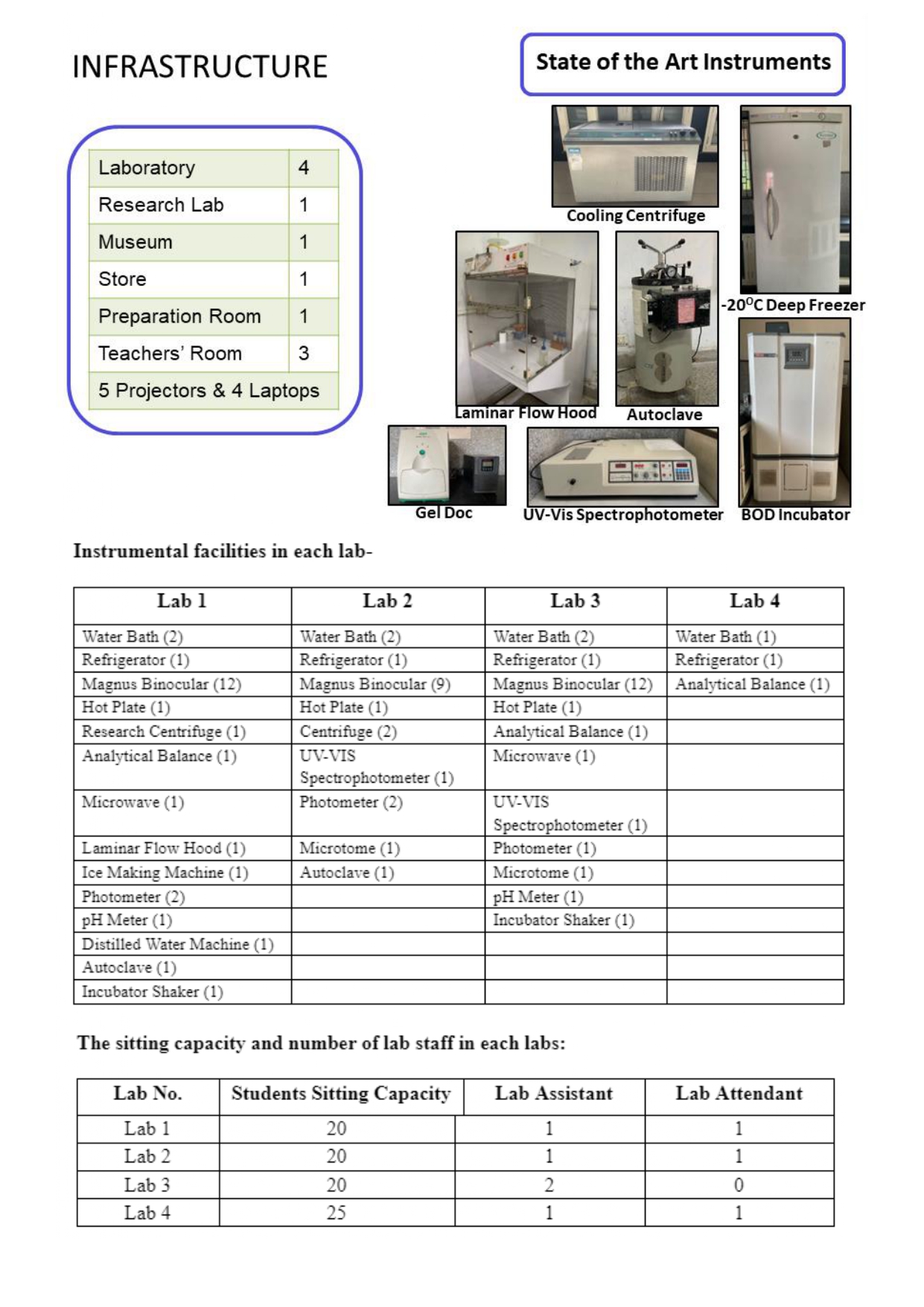LABORATORIES/ ZOOLOGY MUSEUM/ RESEARCH LAB
LABORATORIES:
The Zoology Department with its dedicated and well-qualified faculty members not just help in building scientific knowledge among the students, but also make them technically sound so that they can take faster strides in academics as well as research activities.
Well-equipped laboratories are crucial for the practical training and research activities of students in the field of zoology. These laboratories provide hands-on experience and enable students to apply their theoretical knowledge to real-life situations. The availability of necessary facilities ensures that students can conduct experiments and research effectively.
The department has 4 well-equipped laboratories with dedicated and qualified lab staff which cater to the need of conducting practicals for B.Sc.(H) and B.Sc. Life Science students.
The laboratories are well-equipped with a diverse array of instruments and equipment, catering to the needs of various disciplines within zoology. From biotechnology and reproductive biology to developmental biology, medical diagnostics, physiology and biochemistry, molecular biology, immunology, genetics, ecology, cell biology, food and nutrition, research methodology, comparative vertebrate anatomy, and animal diversity, our laboratories offer a comprehensive platform for hands-on learning and scientific exploration.
With the latest tools and resources at their disposal, our students have the opportunity to delve into the fascinating world of zoology and apply their theoretical knowledge to practical scenarios. Whether it's conducting experiments to understand cellular processes, analyzing genetic data, exploring ecological interactions, or studying animal anatomy, our laboratories provide the necessary infrastructure for meaningful scientific investigations.
ZOOLOGY MUSEUM:
The Zoological Museum at our college is a treasure trove of specimens that serve as an invaluable teaching resource for the Department of Zoology. With a collection of 283 specimens representing various phyla of the animal kingdom, the museum showcases the remarkable diversity of animal life.
Among the rare and noteworthy specimens are invertebrates like Physalia, commonly known as the Portuguese Man of War, Hyalonema, the Glass Rope Sponge, and Chaetopterus. The collection also includes vertebrates such as the Loris, Guinea Pig, Fruit Bat, Duck, Barn Owl, and a variety of snakes, highlighting the breadth of animal species represented.
The museum proudly displays complete skulls of animals like the horse, goat, dog, shrew, hedgehog, crow, cobra, and tortoise. Additionally, there are well managed disarticulated skeletons of the frog, rabbit, Varanus, fowl, Labeo, as well as their articulated counterparts.
For the study of histology, cytology, and developmental stages, the museum boasts an impressive collection of approximately 702 slides, including histological sections, cytological preparations, whole mounts of developmental stages, sections of organisms, protozoans, placentae, and tissues.
To facilitate comparative studies, the museum features molluscan shells, plastron and carapace of turtles, as well as hearts and brains of frogs and sheep.
The highlight of the museum is the stuffed specimen of a Python with a Civet cat, Dolphin, Pangolin, Russel Viper, and Varanus, captivating visitors with their unique characteristics and significance in the animal kingdom.
All specimens in the museum are meticulously preserved and displayed with accompanying labels providing detailed information about each exhibit. This ensures that students can engage in a comprehensive and informative exploration of the animal specimens on display.
The Zoological Museum is a testament to the department's commitment to providing students and researchers with a rich and immersive learning experience. It serves as a hub for the study and appreciation of animal diversity, allowing for in-depth examination and comparative analysis.
Under the Annual Research Project (ARP_Jan2023_02) entitled "Quick Responsive Coding of Specimens and Slides and other preserved collections in the Zoology Museum of Maitreyi College, University of Delhi", 8 students from Zoology and Life Sciences (Khushi Prajapati, Soniya, Shweta, Sweta Rajak, Siddhi Gupta, Pratibha Kapkoti, Astha Kumari, Jagriti Mehta) along with their mentors, Dr. Jaspreet Kaur and Dr. Tejendra Kumar generated unique QR codes for all the museum collections and then prepared a consolidated database in 2022-23.
RESEARCH LAB:
In addition to teaching, the efficient faculty members also ensures students participation in various research activities and summer internship projects by creating eagerness and interest toward the research work. To facilitate the same, the department has a research laboratory with facilities like a refrigerator, deep freeze (-20⁰C), oven,cooling centrifuge, BOD and PCR machine.
